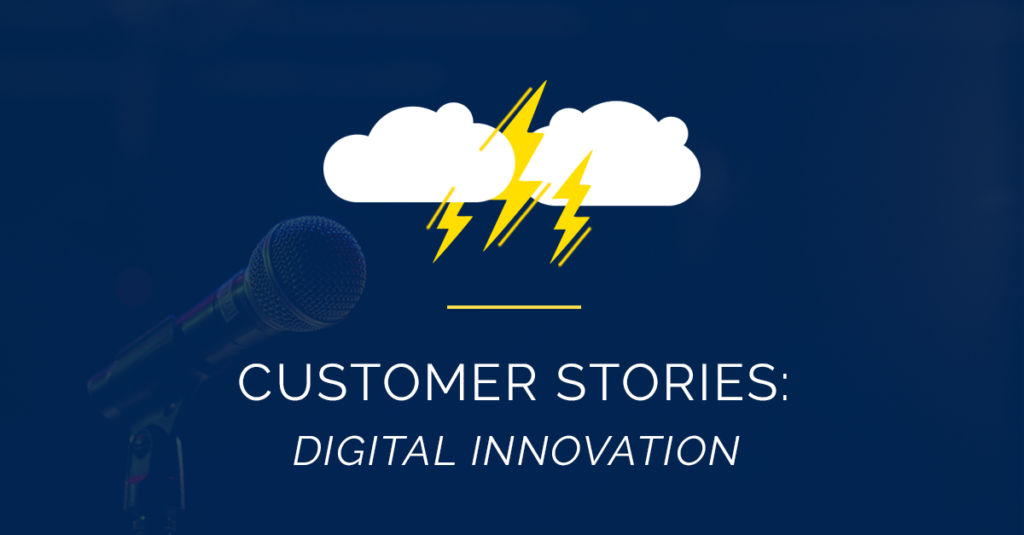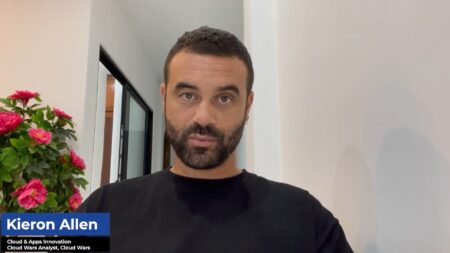Below is a lightly edited transcript of my conversation with Marriott Global Officer Brian King. In his role—his full title is Global Officer – Digital, Distribution, Revenue Management & Global Sales—Brian drives growth and innovation for the hospitality company. We discuss going “beyond personalization” to surprise and delight customers, and why Brian believes that he can’t be precious about process.
This interview took place in September 2018.
Bob Evans: Our guest today is Brian King of Marriott International. His full title is Global Officer for Digital Distribution, Revenue Management and Global Sales. Brian, welcome to the Cloud Wars Live podcast and thanks very much for joining us.
Brian King: Thanks for hosting me, it’s great to be here.
BE: Brian, a key part of Marriott’s strategy is to deploy new technologies that are enabling your employees to deliver fabulous guest experiences that go beyond personalization, to anticipating the needs of guests. Could you talk a little bit about that evolution—from personalization to anticipating—and why’s that so important?
BK: Great question. I think you have to just step back for a moment and think about what hospitality’s really all about. It’s really about human connections; we want to connect people from across the globe.
We believe that human connections actually drive us to be better people and the world to be a better place. So we want to make sure that our associates can make connections in a way that gives them the most up-to-date, current information at their fingertips to serve our customers and reduce any friction they may have.
************
You can stream this whole conversation on Cloud Wars Live.
************
Marriott International’s Brian King on Technology in Hospitality
Technology is a critical cornerstone. It enables our associates to make those hospitality connections. Because at the end of the day, from our perspective, a guest-associate interaction is the moment of truth. We want the guest to walk away from that moment of truth and be absolutely delighted, mesmerized or surprised how we were actually able to anticipate their needs and exceed their expectations.
For any great hotelier, that’s when you really know you’ve done your job well: when you exceed the expectations of customers. Technology is foundational to doing that. What’s been interesting in recent years is that customers are definitely willing to disclose information about how they want to be treated and what’s important to them in a hotel. Now they’re actually saying, when I arrive at your hotel I want to know about this type of restaurants in the city or I’m actually looking for an experience with my family.
They’re giving us insight so we can curate in advance and actually make their stay as frictionless as possible. Our dream is that they never have to ask. We can just service them and we’re ready to be there. And technology’s absolutely the cornerstone of making that happen.
BE: Certainly not at any Marriott properties, but I’ve been at some hotels where I was mesmerized, not so by the great experience, but rather by what the heck are these people thinking. It’s great to hear you talk about the human connection and how that makes the world a better place.
One of the interesting things that Marriott is doing is allowing guests to engage with your Marriott associates via whatever medium is most convenient: phoning or text or social media. Could you talk about the types of outcomes you’ve seen from that openness?
BK: Dating myself, when I first started in the hotel business a long time ago, there were really only two ways to interact. You had to physically be at the property or you had to call us; you couldn’t make a reservation without making a phone call. It didn’t exist.
Obviously, the e-commerce revolution happened. You can now make your reservations online. And sometimes people think it’s just millennials, and that’s not the case. Chat has grown exponentially and it’s grown month by month. So our customers now can chat directly with our hotels and they can chat directly with our customer engagement centers. We don’t even call them reservation centers anymore because most of the transactions that we’re having with customers are no longer just making reservations.
Our view of chat is that it is still a human interaction. Those chats are taking place with people on the other end, so there is a digital connection but it’s still a human connection and we feel very strongly about that.
Marriott International’s Brian King on Evolving Customer Expectations
BE: Brian, just a second ago you touched on the term millennials. I know that sometimes we fall into generalizations about that, but I wondered if you could talk about behavioral patterns you see among your guests across an age spectrum. Is there any differentiation about the adoption rates of some of the new sorts of technology front ends that you’re using?
BK: There’s no doubt about it. We know that millennials, because they’ve grown up in this age of mobile, are early adopters for sure. But the adoption window for the other generations is much shorter than it used to be. Any consumer wants things done in a way that services them, versus being herded like cattle. That’s the beauty of the age that we live in now. No matter how consumers want to communicate with the brand, you as the brand have a responsibility to build those vehicles, whether they’re voice-enabled, chat-enabled, email-enabled and whatever the next evolution of that is going to be.
One thing I notice that’s different when I think about generational travel is what I call tribal travel. It’s this consensus-driven approach to a trip. In the past I think that was driven more in a family hierarchy, top down. Today, it’s different. And we actually see children today being much more informed, because they have access to information and can direct: here’s what we really want to experience and do. That’s an interesting shift for us to watch in the travel space and certainly in hotels.
BE: Brian, that’s so interesting too, as you flip this back to your earlier comments here. Namely, how do you turn the thing inside out, change the old traditional models of we have this many rooms, it’s this price, and that’s it—to instead turning that global network of 6,700 properties into something that is as flexible as it can be. How do you meet the needs of the people who want to have an experience, not just rent a room for a night.
BK: That’s exactly it. Lodging is not a commodity purchase, right? This is about experiences. And I think the biggest change in the industry is every hotel has its own story to tell and there’s a reason why that hotel exists. We want to make sure that, like a character in a book, you as the guest are really the hero.
That means being storytellers about the property, so people can see themselves in the story or there’s additional chapters that they can discover on their own and actually write their own story. We’re there to help guide them through that journey. When they leave that hotel, we want for them to have collected experiences that will live with them for a lifetime—and maybe that’ll change the way they think about the world or a place they’ve visited. If we can accomplish that as a hotelier, we’ve accomplished more than just a clean room and a nice place to stay.
BE: That’s a great way to put it, Brian.
Marriott International’s Brian King on Balancing Values and Outcomes
You talk about being a storyteller and driving these experiences. And then there’s your title: global officer for digital, distribution, revenue management and global sales, which are all incredibly important, but it sounds a little dry. How do you reconcile the outcomes that you’re driving and the philosophy that you bring to your job?
BK: That’s right. I always say, there’s the balance sheet and then there’s the payroll sheet. So with the balance sheet you’re driving towards performance, and that’s what your shareholders hold you accountable to.
And then there’s the payroll sheet. These are the people who run our business every day and they’re the ones who actually drive those outcomes. So it’s not an either/or, it’s a both. That’s one thing that Marriott has always done incredibly well. We know we’re a people-first company, we know that when our associates take great care of the customers they’re gonna come back, so in turn we always have to take great care of our associates. That’s a core management principle of ours. Take great care of your associates, they’ll take great care of the customers, the customers will come back. And that’s tried and true and a value that won’t waver.
So, back to my long and interesting title. All of those functions, one of which is also the customer engagement centers, that all has to connect. I definitely take and my team takes an omnichannel view of the entire customer experience; I look at all individual customers from a 360-degree view.
How did they interact with our mobile application? Did they switch over and use a web application? What happens if they decided to chat with our CECs and then that chat turned into something directly with the property? To weave that entire network together in a way that’s frictionless and connected for our customers, you do need one person who oversees it.
Marriott International’s Brian King on Busting Silos and Processes
I grew up in a small dairy farm in Wisconsin, and silos always scared me. I don’t like silos. Everything has to be connected like beautiful fields of waving wheat and that’s how business should work. It should flow and move together in a beautiful matrix organization.
BE: Brian, there’s almost a magic that happens when you get some of those constructs, walls and silos knocked down. The old model was, hey, we’re trapped, the process rules us, we don’t rule the process.
And again, what’s so interesting about what you’re describing is that it’s almost like the company erased the past. Like they said, “We’re gonna create a new sort of hospitality company built around this customer and the adventure and the human connection.” So as you describe how you pull those different threads together—plus customer engagement—it really seems to be the model for what businesses need to be, going forward into this customer-driven future.
BK: Our founder always said something that rings true to us today and that’s success is never final. And the DNA of our company is always reinventing, always trying to do better.
We’ll look at a process that might have been around for ten years or maybe around for ten months and say, Is that still good? Is there something better out there? Why are we doing it that way? Part of that is being real smart about your leadership and having people come in with fresh eyes. When a business leader holds something to their heart that’s just super precious in a process, there’s risk with that. Company values that ground you, you hold precious, right? You build your organization around that. But the processes should never be precious. When they become precious they become institutionalized and sometimes that institutionalization can actually hurt the foundation of the organization.
BE: I love this comment: processes should never be precious.
Marriott International’s Brian King on Emerging Trends
Brian, I want to make sure given this incredible perspective you have on the hospitality business and your customers, could you talk about some of the emerging trends that you and your team focus on?
BK: One of the big trends that is happening in hospitality today is what we’re seeing in the food and beverage space. People are on the hunt for the new, the interesting, the yet-to-be-discovered food and beverage opportunity. Guests eat with their eyes. That has significant implications for digital; you’re seeing that with digital applications outside of lodging, whether it’s Galley or Uber Eats, people are no longer just going to their local pizza joint. They can have anything they want delivered whenever they want it. I want my gluten-free vegan meal delivered exactly 4:30 for my family of four.
That ability for choice and control is one thing, but you have to have the delivery mechanism to get that to the customer. We’re really focused on how technology intersects with food and beverage right now. What people do in their home, they also expect when they travel.
Another trend is in design. That’s one thing the millennial generation really has pushed people’s thinking on: good design. They grew up in a time when Steve Jobs and Apple showed them what great design could be digitally—so they expect that. When you think of the amount of retailers that have emerged as their own strong design sensibility, that tells you you have to respond. We don’t even call it a lobby anymore. It’s a living room in some of our brands.
It’s a place to commune, to congregate, try something new, meet new people. And if you think about people who are sitting and working next to each other on long communal tables, that changes your food and beverage design. It changes, frankly, your functional furniture design. There’s a place to relax, to work publicly or privately, and that’s very different than it was 10, 15 years ago.
Marriott International’s Brian King on Data, Privacy, and Trust
BE: Two other things, Brian, I wanted to ask. Key to providing great experiences is knowing a little bit about the individual guests. How do you get close enough to customers without the customer feeling like, hey, these guys are getting a little too close?
BK: It’s really customer-directed; it’s what you’re willing to tell us about your experience. People have different degrees of what they’re willing to disclose to any brand. But I think what makes lodging or travel unique is, people generally understand, when you’re telling us your preferences it’s to make your stay better. It’s not to market to you or to give you messages you’re not interested in. If you always want to have a high floor and this particular pillow type and you always want a king, those are the things we love to hear and do it really well. Also, if you have allergies, we want to know about that, right?
So people are willing to give information that’s gonna help them. It’s always about what the customer wants. We never want to be creepy. That’s not what we’re about. We’re there to serve and anticipate needs based on what you tell us so that’s how we look at it.
Marriott International’s Brian King on What Comes Next
BK: Boy, the future is bright. We have a lot happening on the digital front, including rethinking the digital experience on our mobile application and web application. We want to make sure that when people enter those digital experiences they see even more choices tomorrow than they do today. I fundamentally believe that as we think about digital design it needs to be incredibly friendly and easy. But we also want to start making suggestions.
Out of the category brands, I’m always amazed by Netflix. They developed a personalization strategy that is always offering up new and interesting entertainment choices that appeal to me directly. Well—how do we do that with our digital applications in a way that appeals to our customer?
Personalization will continue to be a thrust of ours, as well as this idea of orchestrating your stay. We’re looking at different ways to bring your entire itinerary together. Not just your air, your car or your hotel—but those experiences that you book if you’re doing some interesting tour of New York.
One thing we do know that customers love is when everything is synthesized together, versus having to bop around for information. So we really want to be the hub of information to make their travel easy—and then offer other things. Maybe when you’re not traveling or staying with us, you still use them in our mobile app, because we can bring experiences directly to you that makes your life easier. To me it’s about hospitality, day in and day out. And the world would be a better place if we were just all more hospitable together.
BE: Brian, this has been just terrific. Thanks. Your way of describing things and revealing your passion for what you do comes across marvelously here and you’ve given our listeners a great look into what the expectation should be for staying at a hotel.
BK: Well, Bob, thanks so much. Keep traveling, keep exploring. The world’s a great place to discover.
You can stream this whole conversation with Marriott International’s Brian King here.
*******************
RECOMMENDED READING FROM CLOUD WARS:
The World’s Top 5 Cloud-Computing Suppliers: #1 Microsoft, #2 Amazon, #3 Salesforce, #4 SAP, #5 IBM
Amazon Versus Oracle: The Battle for Cloud Database Leadership
As Amazon Battles with Retailers, Microsoft Leads Them into the Cloud
Why Microsoft Is #1 in the Cloud: 10 Key Insights
SAP’s Stunning Transformation: Qualtrics Already “Crown Jewel of Company”
Watch Out, Microsoft and Amazon: Google Cloud CEO Thomas Kurian Plans To Be #1
The Coming Hybrid Wave: Where Do Microsoft, IBM and Amazon Stand? (Part 1 of 2)
Oracle, SAP and Workday Driving Red-Hot Cloud ERP Growth Into 2019
*********************








